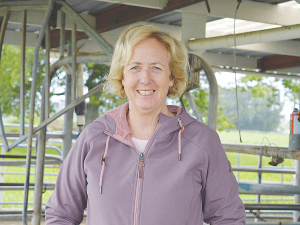Another Windfall for Fonterra Farmers, Unit Holders
Fonterra farmer shareholders and unit holders are in line for another payment in April.
 Donna Smit believes meeting sustainability targets is one of the biggest challenges facing NZ dairy farmers.
Donna Smit believes meeting sustainability targets is one of the biggest challenges facing NZ dairy farmers.
Former Fonterra director Donna Smit says meeting sustainability targets remains one of the biggest challenges facing New Zealand dairy farmers.
Smit, who stepped down at the co-op’s annual meeting last month after serving six years on the board, says the requirement for farmers to stay ahead of the rest of the world is a pressure.
The Government has set into law a target for net zero greenhouse gas emissions by 2050. Smit told Rural News that NZ dairy farmers had one of the lowest carbon footprints in the world.
“Meeting the sustainability aspirations of society, despite being the lowest carbon footprint farmers in the world is a challenge,” she says.
“Meeting the Governments Zero Carbon proposal is concerning for farmers when the technology is still to catch up to the Government’s aspirations.
“It would be a shame to see our industry negatively impacted in the pursuit to lead the world.”
She says the tight labour market is also proving a challenge for farmers.
“I believe as an industry we are good employers; we offer good career prospects. However, I see the inability to source enough staff putting a lot of pressure on farm owners, sharemilkers and contract milkers,” Smit says.
“Personally, I do not like how our migrant workers cannot have their immediate family live in NZ. To me this does not meet the values of a modern society and it’s putting NZ at a competitive disadvantage.”
Cost inflation and rising interest rates are also a challenge. However, she notes that the repayment of dairy debt over the past three years has been “admirable”.
Smit says the same compliance paperwork required by several different organisations all in slightly different formats is a constant source of frustration for farmers.
“Data must be standardised and digitised.”
Despite a list of challenges, Smit believes it’s a great time to be a food producer. “Being an essential industry during Covid and being able to continue during lockdown was necessary but an advantage to other industries.
She adds that Fonterra’s innovation strategy is a lot to look forward to.
Number Crunching!
Smit, a chartered accountant by profession, says she will now spend more time with her family and continue number crunching for their farming interests.
With husband Corrie, Smit has dairy farms in Whakatane and Oamaru. They also own kiwifruit orchards in Bay of Plenty.
Her message to Fonterra farmers is to stay engaged with the co-operative.
“Farmer directors who live on dairy farms, have their capital at risk and know the dairy industry from the ground up add real value to your co-operative,” she claims.
“Stay engaged with your co-operative: our collective strength helps to de risk your business and is the envy of the world.
Smit believes that milk is a wonderful nutrient dense super food and says: “we have only just begun to unlock its brilliant properties”.
Agrisea NZ has appointed Craig Hudson as it's new chief growth officer.
State farmer Landcorp, trading as Pamu, is a forecasting a full-year net profit of around $100 million.
Tony Aitken, chief executive of Ruralco, has been awarded the Excellence in Business Leadership Award at the ANZ Business of the Year Awards.
Global trade has been thrown into another bout of uncertainty following the overnight ruling by US Supreme Court, striking down President Donald Trump's decision to impose additional tariffs on trading partners.
Controls on the movement of fruit and vegetables in the Auckland suburb of Mt Roskill have been lifted.
Fonterra farmer shareholders and unit holders are in line for another payment in April.